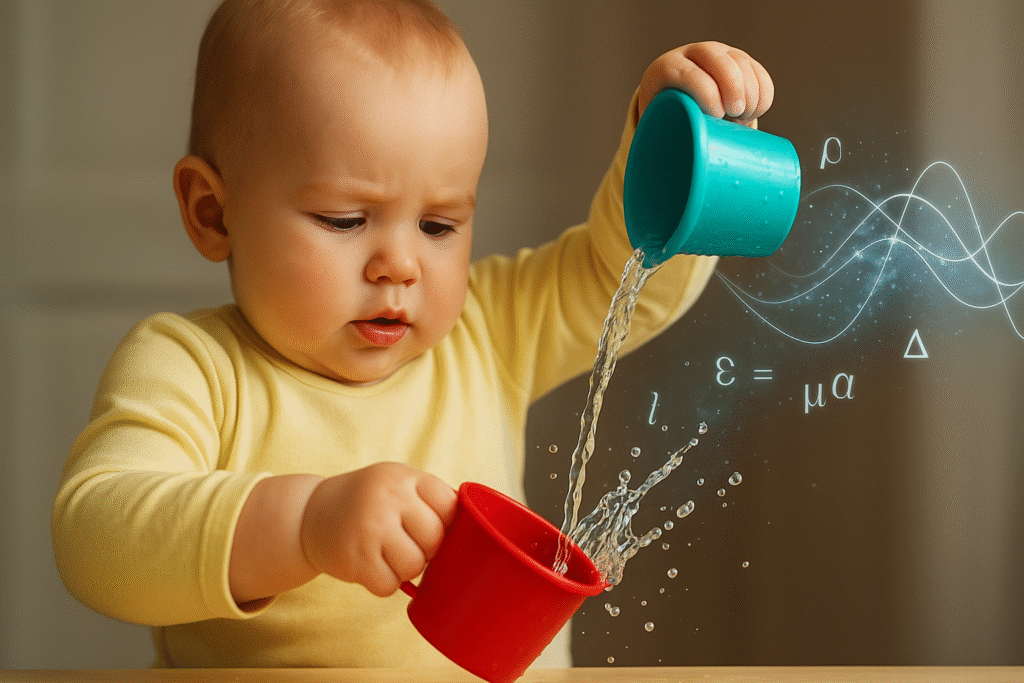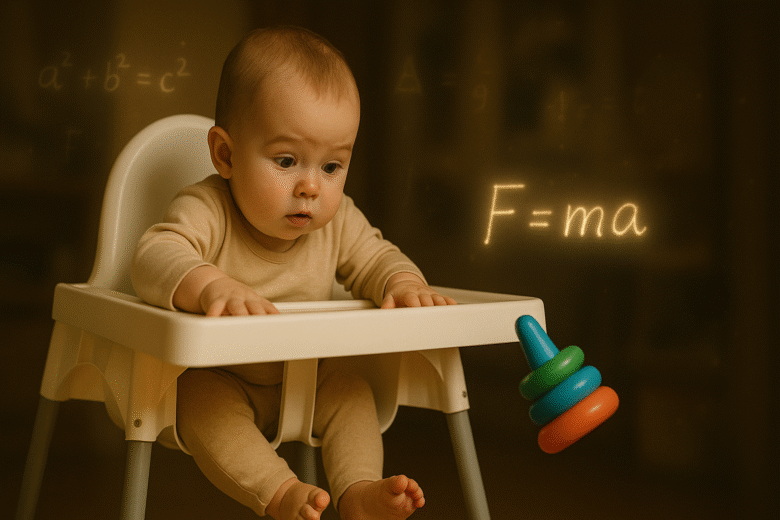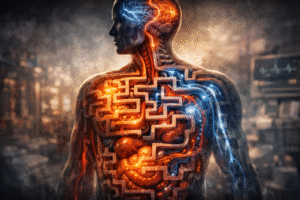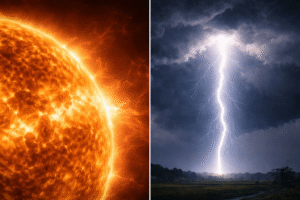Fun fact: A six-month-old baby already knows that if you drop a ball, it should fall—not float.
Yes, before babies can say “mama” or “papa,” they already carry an intuitive grasp of gravity, solidity, and cause-and-effect. This astonishing insight is at the heart of modern developmental science. The topic—Why Babies Understand Physics Before They Learn to Talk—forces us to rethink what intelligence really is and when it begins. Are babies little scientists long before they become chatterboxes?
Born Scientists in Diapers
Most of us imagine babies as blank slates—tiny creatures waiting for language and education to fill their minds. But research suggests the opposite: infants arrive with an inbuilt toolkit of “core knowledge” about how the physical world works.
Take the work of Elizabeth Spelke, a psychologist at Harvard University (a leading research university in the United States). Her studies show that babies stare longer at “impossible events”—like a toy car passing through a solid wall—because their intuition tells them something’s wrong. Even at six months, they expect objects to behave according to physical laws.
Babies don’t need complex formulas—they instinctively understand how the world works.
Everyday Examples of Baby Physics
If you’ve ever spent time with a toddler, you’ve witnessed their physics experiments:
The Drop Test: Babies drop spoons, toys, or food from their high chairs. Annoying? Yes. But it’s also a way of testing gravity. “If I let this go, what happens?” They repeat it not to torture parents, but to confirm the law of falling objects.
Peek-a-Boo: This isn’t just a cute game. Babies discover that objects don’t vanish just because they’re out of sight. When your face reappears, you prove their theory right.
Stacking Blocks: Babies explore balance, weight, and stability. A toppled tower isn’t failure—it’s a mini engineering lesson.
By the time a child can walk, they’ve run hundreds of small experiments. Their lab is the living room. Their test subjects? You.
Case Studies: Science in the Crib
- The Car Behind the Screen
In a famous experiment, researchers rolled a toy car down a track. When a screen was placed in the car’s path, but the car appeared to roll through it, babies looked surprised. They already knew objects can’t pass through solid barriers. - The Magic Floating Block
When babies see a block hanging in midair without support, they frown and stare longer. Their intuition rebels: “Things can’t float.” They expect gravity to pull it down. - Water Play
Give babies a cup of water, and they quickly figure out pouring fills, spilling empties, and splashing spreads. Archimedes would be proud.
These experiments show that before language, before numbers, before science textbooks, babies have a physics “starter pack” built into their minds.
Why Would Evolution Gift Babies Physics?
Let’s get provocative: why should evolution bother? Babies aren’t solving equations or building bridges. Why preload their minds with physics?
The answer may lie in survival. A baby who understands that unsupported objects fall is less likely to crawl under a wobbling rock. A child who expects things to stay solid learns faster how to handle tools, food, or shelter. Physics isn’t about blackboards—it’s about not getting crushed.
Evolution favours early learners. And physics is the first subject in the syllabus of life.
Babies vs. Adults: Who’s Smarter?
Here’s the twist. Adults, with our education, sometimes unlearn this raw intuition. We trust GPS apps blindly, even if they tell us to drive into a river. Babies, by contrast, trust their senses. They test, doubt, repeat.
In some ways, a baby’s worldview is more scientific than an adult’s. They don’t assume—they verify. Imagine if adults had the patience to question everything with the same curiosity. Wouldn’t science move faster?

The Role of Play: The First Laboratory
Play isn’t frivolous. It’s experimentation. Every time a baby stacks, topples, spills, and tries again, they’re conducting experiments. Parents often try to tidy up quickly, but every toppled tower is a data point.
Psychologists now argue that play is the crucible of cognition. It’s where children explore physics, chemistry, and even social “laws.” To discourage play is to stifle science in its earliest form.
What This Means for Parents and Educators
If babies are already tiny physicists, then early childhood education should build on, not ignore, their instincts. Instead of handing toddlers digital tablets, give them blocks, balls, and water. Let them mess up. Let them test.
Early physics isn’t about equations—it’s about interaction. The more a baby touches, drops, and experiments, the deeper their intuition grows. And that intuition later scaffolds formal learning in school.
The Provocative Question: Are We Dumbing Them Down?
Here’s where it gets uncomfortable. Modern parenting often interrupts baby physics. We strap them into strollers, sanitize their toys, and distract them with cartoons. In doing so, we may deprive them of the messy experiments nature designed them to run.
Are we unintentionally dulling the very curiosity that makes humans such good learners? Babies aren’t fragile—they’re scientists. The real danger may be that we stop them from exploring too soon.
Conclusion: The Little Newtons Among Us
Babies don’t need words to grasp the world. They don’t need equations to test reality. Before they can talk, they already understand physics at a primal level.
So the next time a toddler drops food for the hundredth time, don’t just groan. Remember: you’re watching a physics experiment unfold in real time. That baby isn’t messy—they’re brilliant.
Maybe, just maybe, we should all relearn to see the world with their wide, questioning eyes. After all, the first scientists weren’t grown-ups in labs—they were babies in cribs.
Author’s Note
This piece made me realize that perhaps babies aren’t learning from us as much as we think. Maybe we’re the ones who need to learn from them—how to stay curious, how to test reality, and how to never stop asking “what happens if…?”
G.C., Ecosociosphere contributor.




